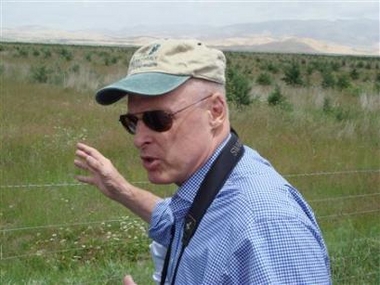Paulson urges China to let yuan rise faster
(Agencies/chinadaily.com.cn)
Updated: 2007-07-31 16:02
Updated: 2007-07-31 16:02
BEIJING - US Treasury Secretary Henry Paulson renewed his efforts on Tuesday to persuade China to defuse growing political tensions over the yuan by allowing the currency to rise faster.
 US Treasury Secretary Henry Paulson views a reforestation area aimed at combating the advancement of desert near Qinghai Lake in western China July 30, 2007. [AP]  |
Paulson, who has made it a priority to strengthen economic relations with China, started a round of meetings with senior officials including central bank governor Zhou Xiaochuan and Vice-Premier Wu Yi.
As well as pressing for faster appreciation of the yuan, Paulson has said he will urge China to wean its red-hot economy off exports and permit greater foreign access to the country's financial services sector.
Paulson's visit coincides with a drive by US lawmakers to advance legislation aimed at forcing Beijing to allow open markets to set the yuan's value.
Speaking to reporters on Monday in the western province of Qinghai, the Treasury chief expressed concern about the legislation, saying he preferred to secure currency and economic reforms through dialogue.
Paulson, who will meet President Hu Jintao on Wednesday, said he understood the motivation behind the various bills and why Americans were frustrated by the imbalance in trade with China.
But he added: "I don't want China to become an increasingly big political issue in the US."
Paulson said he would make the case that the greater risk for China is that it moves too slowly on reform, not too quickly.
Rising Yuan
Paulson also stresses the importance of building up long-term relationships with Chinese policy makers. He visited the country some 70 times when he ran investment bank Goldman Sachs and is on his fourth visit in just over a year as Treasury secretary.
Nevertheless, Chinese officials have consistently said that they will enact reforms and free up the yuan on their own timetable.
The yuan has risen more than 9 percent against the dollar in the two years since China stopped pegging it against the US currency.
Critics say that is far from enough. They point to China's record stash of $1.33 trillion in foreign exchange reserves and big balance-of-payments surplus as evidence that, if market forces and not the central bank were to determine the yuan's rate, the currency would be worth much more.
China retorts that millions of export-related jobs could be at risk if the yuan were to climb any faster and says the United States needs to save more and spend less to reduce its deficit.
|
|
|
||
|
||
|
|
|
|